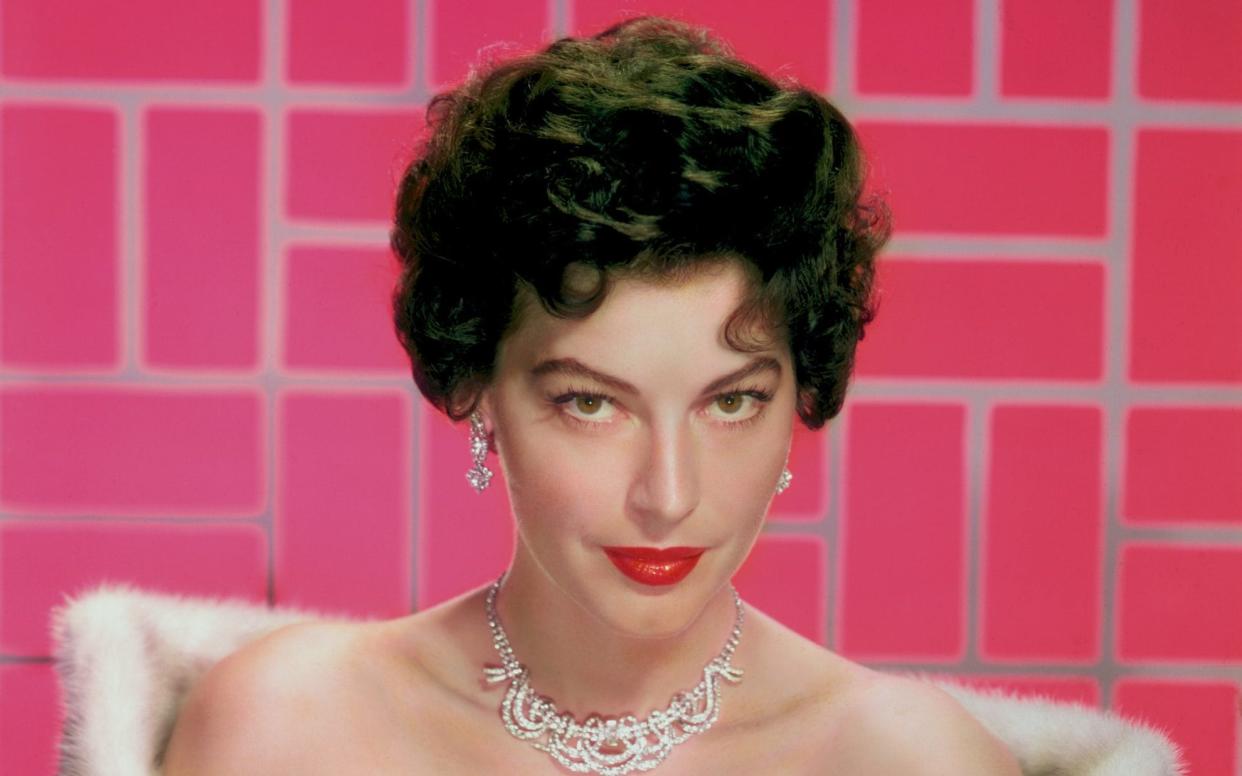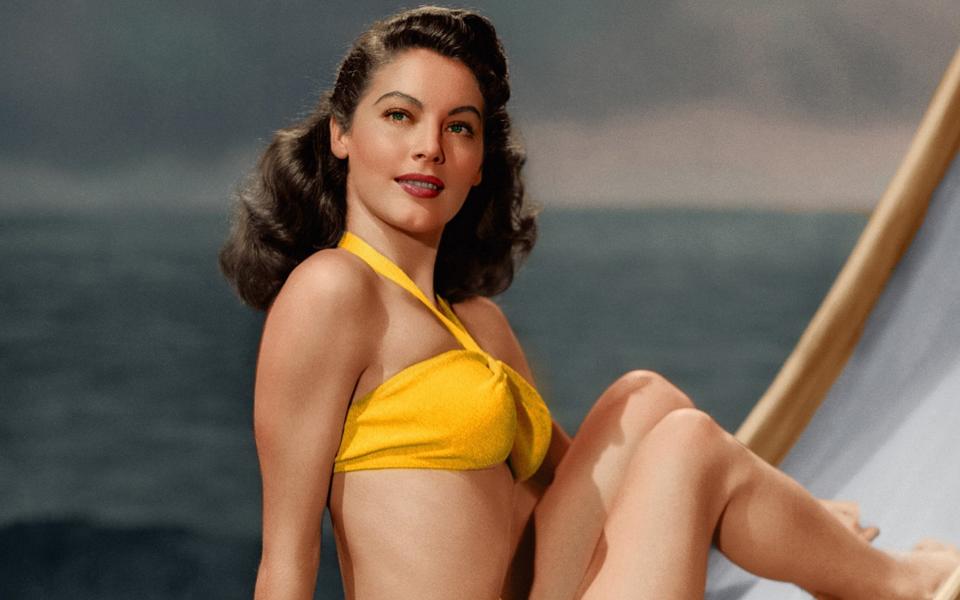Behind Ava Gardner's tough talking: ‘I’m scared, baby, scared’

‘I’m so f------ tired of being Ava Gardner,” said Ava Gardner, shortly before her death in 1990. It’s not hard to appreciate her fatigue. For decades the tabloids had been following and encouraging her rambunctiousness: Ava Gardner Drunk on Arrival at Hotel. Ava Gardner Smashes Up Hotel Suite. Ava Gardner Hurls Champagne Glass at Hotel Manager. It was all in a day’s work for the star to scuffle with photographers, their cameras crashing to the pavement. Nor were co-stars and suitors immune from her flying fists. She once hit Shelley Winters with a bottle. Howard Hughes was knocked unconscious with a brass ashtray. Gardner met her pugilistic match, however, with George C Scott. He beat her up at the Savoy, followed her to Rome and beat her up again, and their final bout was in Hollywood. “I’d be lying there next to him, black-and-blue and bleeding… There was so much blood,” she remembered, almost wistfully.
But is she herself remembered? Not really. Bhowani Junction, Mogambo and The Cassandra Crossing are on few film buffs’ lips, and the actress herself had scant regard for her own abilities: “I really don’t think I’m any good. There is something lacking.” Nevertheless, it is her awkwardness, her hesitancy, which is of interest. Despite being cast as Russian countesses, Indian princesses, Seville flamenco dancers and the Empress of Austria (in Mayerling), there was never much between Gardner and the camera. She was exposed, unprotected, her personality, as Humphrey Bogart says in The Barefoot Contessa, “wide open to be hurt badly.”
And she so often was. There’s certainly partial truth in her confession, “I am not a bitch. I am not temperamental. I am scared, baby, scared.” Gardner was born in North Carolina in 1922, her parents dirt-poor sharecroppers. “I’m just a plain, simple girl off the farm,” she always maintained. As a result of a film-test she was bidden to Los Angeles, where she was cast by MGM in Maisie Goes to Reno and within days met Mickey Rooney. He was 5ft 2in and liked big, tall girls. They were married in 1942. “The smallest husband I ever had, and the biggest mistake I ever made,” she reflected later. In fairness, she’d been warned. “Once he gets into your pants,” Louis B Mayer predicted, “he’ll be tired of you and he’ll chase after some other broad” – which Rooney did, on their honeymoon. He also purloined her jewels to cover gambling debts. If Rooney was very unrelaxing – “There wasn’t a minute when he wasn’t on stage” – it is the case that Gardner never sought tranquil types, and she liked having flings with bullfighters so much she rented a villa in Madrid, though declined to learn Spanish.
She allowed herself to be pursued, stalked, by Howard Hughes, who laid on private planes, took her to restaurants and hotels, which he’d buy on the spot in order to empty them of other diners and guests. Gardner, in return, drove him to distraction by rubbing Vaseline between her bosoms to accentuate the cleavage. It was to calm the bust-obsessed billionaire down that she had to clonk him with an ashtray. When he regained consciousness, he asked her to marry him. She declined, even though, as she put it, “We usually had a good time in the feathers.” Looking over the biographies, her story is that of a woman who always seemed to be having abortions or recovering from a drunken scene. She was frequently between men, abandoned by them, one way and another. They never made her safe. In October 1945, for example, she married Artie Shaw, the bandleader, and divorce proceedings commenced within a year. “He disregarded my smallest wish and persisted in humiliating me every chance he got,” said Gardner, who had apparently been mocked because she’d never read Tolstoy and Dostoevsky. When she defeated him at chess, “He told me to leave, so I left.”
She was immediately courted by Frank Sinatra, whom she married in 1951. “He has a temper that bursts into flames,” she said. Sinatra was envious of all the bullfighters and kept threatening to commit suicide. Gardner told him to go ahead, so he fired gunshots into a pillow. He was also envious of her fame and glamour, of the attention she was given by the public if she attended one of his concerts. Soon enough, they were “fighting all the time. Fighting and boozing,” she recalled. “Breaking up, getting together again. It was madness.” They were divorced in 1957, but remained close. He always paid her medical bills. Though, in her day, Gardner was called “the world’s most beautiful animal,” her highly made-up oval features, puffy skin and thick wrists don’t particularly conform to modern ideals – she is one of those Hollywood icons who, seen through 21st-century eyes, has a touch of Dame Edna. When Gardner made her legendary crack about Sinatra’s 1966 marriage to Mia Farrow – “I always knew Frank would end up in bed with a boy” – perhaps in a sense he already had, as it’s Gardner’s mannishness that once held her appeal.

He-men such as Ernest Hemingway enjoyed her company: “The most exciting woman of our generation,” he claimed. Fellow big game hunter John Huston said, “She had a kind of random, gallant, wild openness,” exemplified by her habit of starting on the Dom Pérignon at 5am in the make-up trailer. When Huston asked her to be in his film The Bible, Gardner said, “Don’t tell me about God. I know all about that bugger.” She had a gangster outlook on the world, picked up from Sinatra: “Take what you want. Don’t let them use you. They only understand tough.”
She wasn’t feminine. Gabriel Byrne, horse-riding in Rotten Row, for example, was once joined by a woman who had “a fine throaty laugh as if she’d smoked lots of cigarettes.” It was Gardner, and what struck Byrne was her abundant barroom swearing. Yet when Peter Evans, ghostwriting her memoirs, showed her transcripts of their interviews, she was so appalled by the uninhibited effing and jeffing, she cancelled the project. “I think it’s f------ vulgar. I won’t have it, honey.” Maintaining she always hated the cinema (“I do it for the money, that’s all”), Gardner retired in 1972 to Kensington, where “I like to live simply, out of the public eye… The only time I’m happy is when I’m doing absolutely nothing.”
She had no family, no children, no partner. “The highlight of my day is walking the dog” – that, and getting drunk every night with fruity character actor and neighbour Charles Gray. Then she suffered a stroke. She fell down in Hyde Park with a friend who’d had a hip operation and neither of them could get up. “Deep down,” said Gardner, “I’m pretty superficial.” It’s an interesting paradox – the ego of the star, compelling attention, arriving at her first-class accommodation with 30 pieces of luggage, expecting the adoration of an entourage. If all that can’t be possible, the only option is Sunset Boulevard reclusiveness. Not wanting to be seen as ageing and pathetic, Gardner rejected the role of Mrs Robinson in The Graduate. Apart from cameos in disaster pictures like Earthquake or straight-to-video films with Roddy McDowall, she effectively vanished. Her ashes were scattered in North Carolina.


